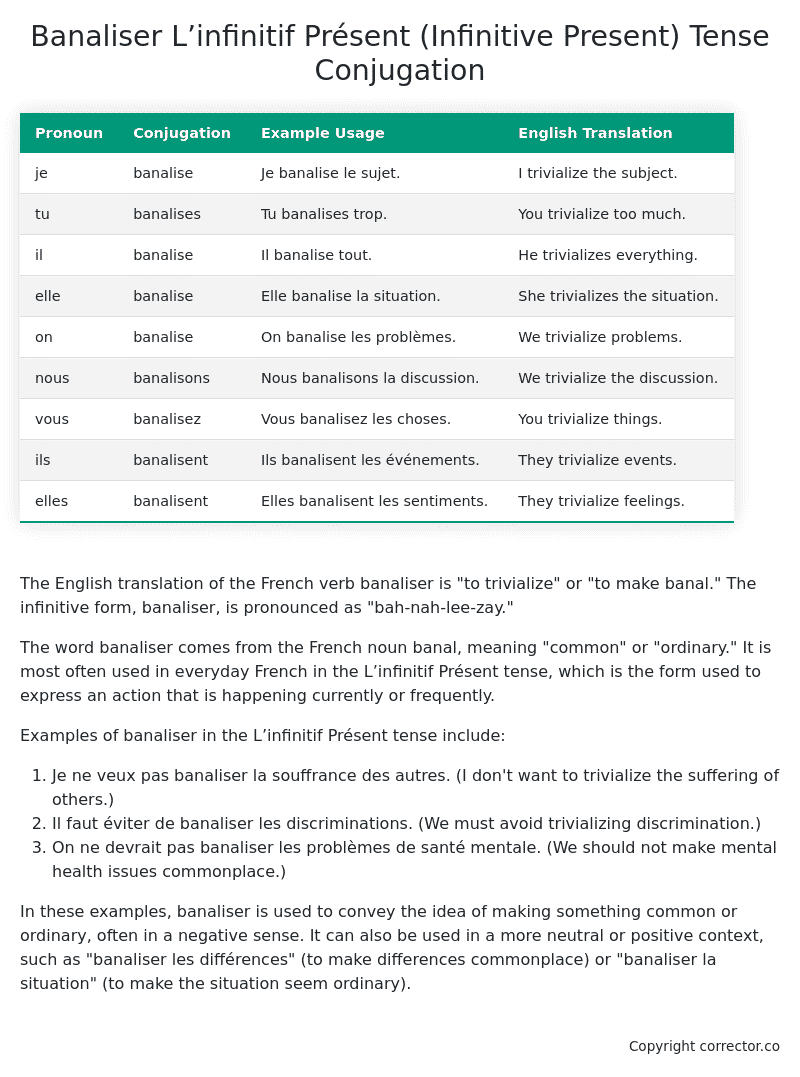L’infinitif Présent (Infinitive Present) Tense Conjugation of the French Verb banaliser
Introduction to the verb banaliser
The English translation of the French verb banaliser is “to trivialize” or “to make banal.” The infinitive form, banaliser, is pronounced as “bah-nah-lee-zay.”
The word banaliser comes from the French noun banal, meaning “common” or “ordinary.” It is most often used in everyday French in the L’infinitif Présent tense, which is the form used to express an action that is happening currently or frequently.
Examples of banaliser in the L’infinitif Présent tense include:
- Je ne veux pas banaliser la souffrance des autres. (I don’t want to trivialize the suffering of others.)
- Il faut éviter de banaliser les discriminations. (We must avoid trivializing discrimination.)
- On ne devrait pas banaliser les problèmes de santé mentale. (We should not make mental health issues commonplace.)
In these examples, banaliser is used to convey the idea of making something common or ordinary, often in a negative sense. It can also be used in a more neutral or positive context, such as “banaliser les différences” (to make differences commonplace) or “banaliser la situation” (to make the situation seem ordinary).
Table of the L’infinitif Présent (Infinitive Present) Tense Conjugation of banaliser
| Pronoun | Conjugation | Example Usage | English Translation |
|---|---|---|---|
| je | banalise | Je banalise le sujet. | I trivialize the subject. |
| tu | banalises | Tu banalises trop. | You trivialize too much. |
| il | banalise | Il banalise tout. | He trivializes everything. |
| elle | banalise | Elle banalise la situation. | She trivializes the situation. |
| on | banalise | On banalise les problèmes. | We trivialize problems. |
| nous | banalisons | Nous banalisons la discussion. | We trivialize the discussion. |
| vous | banalisez | Vous banalisez les choses. | You trivialize things. |
| ils | banalisent | Ils banalisent les événements. | They trivialize events. |
| elles | banalisent | Elles banalisent les sentiments. | They trivialize feelings. |
Other Conjugations for Banaliser.
Le Present (Present Tense) Conjugation of the French Verb banaliser
Imparfait (Imperfect) Tense Conjugation of the French Verb banaliser
Passé Simple (Simple Past) Tense Conjugation of the French Verb banaliser
Passé Composé (Present Perfect) Tense Conjugation of the French Verb banaliser
Futur Simple (Simple Future) Tense Conjugation of the French Verb banaliser
Futur Proche (Near Future) Tense Conjugation of the French Verb banaliser
Plus-que-parfait (Pluperfect) Tense Conjugation of the French Verb banaliser
Passé Antérieur (Past Anterior) Tense Conjugation of the French Verb banaliser
Futur Antérieur (Future Anterior) Tense Conjugation of the French Verb banaliser
Subjonctif Présent (Subjunctive Present) Tense Conjugation of the French Verb banaliser
Subjonctif Passé (Subjunctive Past) Tense Conjugation of the French Verb banaliser
Subjonctif Imparfait (Subjunctive Imperfect) Tense Conjugation of the French Verb banaliser
Subjonctif Plus-que-parfait (Subjunctive Pluperfect) Tense Conjugation of the French Verb banaliser
Conditionnel Présent (Conditional Present) Tense Conjugation of the French Verb banaliser
Conditionnel Passé (Conditional Past) Tense Conjugation of the French Verb banaliser
L’impératif Présent (Imperative Present) Tense Conjugation of the French Verb banaliser
L’infinitif Présent (Infinitive Present) Tense Conjugation of the French Verb banaliser (this article)
Struggling with French verbs or the language in general? Why not use our free French Grammar Checker – no registration required!
Get a FREE Download Study Sheet of this Conjugation 🔥
Simply right click the image below, click “save image” and get your free reference for the banaliser L’infinitif Présent tense conjugation!

Banaliser – About the French L’infinitif Présent (Infinitive Present) Tense
Forming the Infinitive Present
Common Everyday Usage Patterns
As a Verb’s Dictionary Form
After Modal Verbs
As an Imperative
In Infinitive Clauses
Interactions with Other Tenses
Present Tense
Future Tense
Conditional Tense
Passé Composé
Imperfect Tense
Subjunctive and Conditional Moods
Summary
Want More?
I hope you enjoyed this article on the verb banaliser. Still in a learning mood? Check out another TOTALLY random French verb conjugation!


